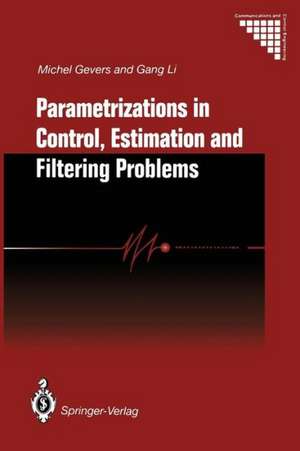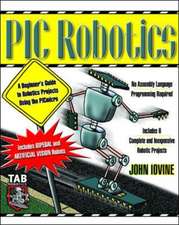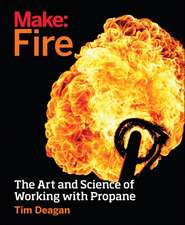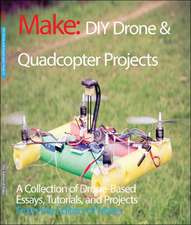Parametrizations in Control, Estimation and Filtering Problems: Accuracy Aspects: Communications and Control Engineering
Autor Michel Gevers, Gang Lien Limba Engleză Paperback – 20 noi 2011
Din seria Communications and Control Engineering
- 15%
 Preț: 659.70 lei
Preț: 659.70 lei - 20%
 Preț: 879.74 lei
Preț: 879.74 lei - 18%
 Preț: 953.65 lei
Preț: 953.65 lei - 18%
 Preț: 1117.03 lei
Preț: 1117.03 lei - 9%
 Preț: 1385.77 lei
Preț: 1385.77 lei - 18%
 Preț: 1128.08 lei
Preț: 1128.08 lei - 18%
 Preț: 953.65 lei
Preț: 953.65 lei - 15%
 Preț: 656.89 lei
Preț: 656.89 lei - 18%
 Preț: 896.52 lei
Preț: 896.52 lei - 18%
 Preț: 1113.26 lei
Preț: 1113.26 lei - 18%
 Preț: 1388.22 lei
Preț: 1388.22 lei - 15%
 Preț: 647.27 lei
Preț: 647.27 lei - 18%
 Preț: 954.45 lei
Preț: 954.45 lei - 18%
 Preț: 1231.47 lei
Preț: 1231.47 lei - 18%
 Preț: 948.92 lei
Preț: 948.92 lei - 18%
 Preț: 1232.57 lei
Preț: 1232.57 lei - 18%
 Preț: 1127.28 lei
Preț: 1127.28 lei - 15%
 Preț: 643.34 lei
Preț: 643.34 lei - 18%
 Preț: 1401.30 lei
Preț: 1401.30 lei - 15%
 Preț: 651.51 lei
Preț: 651.51 lei - 20%
 Preț: 1454.07 lei
Preț: 1454.07 lei - 18%
 Preț: 948.79 lei
Preț: 948.79 lei - 18%
 Preț: 1233.06 lei
Preț: 1233.06 lei - 18%
 Preț: 947.85 lei
Preț: 947.85 lei - 18%
 Preț: 950.96 lei
Preț: 950.96 lei - 18%
 Preț: 956.99 lei
Preț: 956.99 lei - 15%
 Preț: 644.18 lei
Preț: 644.18 lei - 18%
 Preț: 946.87 lei
Preț: 946.87 lei - 18%
 Preț: 951.14 lei
Preț: 951.14 lei - 18%
 Preț: 961.55 lei
Preț: 961.55 lei - 15%
 Preț: 644.18 lei
Preț: 644.18 lei - 20%
 Preț: 990.80 lei
Preț: 990.80 lei - 18%
 Preț: 1006.72 lei
Preț: 1006.72 lei - 18%
 Preț: 942.44 lei
Preț: 942.44 lei - 18%
 Preț: 1233.06 lei
Preț: 1233.06 lei - 15%
 Preț: 641.85 lei
Preț: 641.85 lei - 18%
 Preț: 957.75 lei
Preț: 957.75 lei - 15%
 Preț: 649.87 lei
Preț: 649.87 lei - 18%
 Preț: 958.07 lei
Preț: 958.07 lei - 18%
 Preț: 1117.99 lei
Preț: 1117.99 lei - 18%
 Preț: 1395.94 lei
Preț: 1395.94 lei - 18%
 Preț: 781.62 lei
Preț: 781.62 lei - 18%
 Preț: 953.20 lei
Preț: 953.20 lei - 18%
 Preț: 1109.78 lei
Preț: 1109.78 lei
Preț: 645.14 lei
Preț vechi: 758.99 lei
-15% Nou
Puncte Express: 968
Preț estimativ în valută:
123.46€ • 134.06$ • 103.71£
123.46€ • 134.06$ • 103.71£
Carte tipărită la comandă
Livrare economică 22 aprilie-06 mai
Preluare comenzi: 021 569.72.76
Specificații
ISBN-13: 9781447120414
ISBN-10: 1447120418
Pagini: 392
Ilustrații: XV, 373 p.
Dimensiuni: 155 x 235 x 21 mm
Greutate: 0.55 kg
Ediția:Softcover reprint of the original 1st ed. 1993
Editura: SPRINGER LONDON
Colecția Springer
Seria Communications and Control Engineering
Locul publicării:London, United Kingdom
ISBN-10: 1447120418
Pagini: 392
Ilustrații: XV, 373 p.
Dimensiuni: 155 x 235 x 21 mm
Greutate: 0.55 kg
Ediția:Softcover reprint of the original 1st ed. 1993
Editura: SPRINGER LONDON
Colecția Springer
Seria Communications and Control Engineering
Locul publicării:London, United Kingdom
Public țintă
ResearchCuprins
1 Introduction.- 1.1 Motivation and general statement of objectives.- 1.2 A historical view and some motivating examples.- 1.3 Outline of the book.- 2 Finite Word Length errors and computations.- 2.1 Introduction.- 2.2 Representations of binary numbers.- 2.3 Overflow and quantization errors.- 2.4 Arithmetic computations and roundoff errors.- 2.5 Dynamic range and scaling.- 2.6 Conclusions.- 3 Parametrizations in digital system design.- 3.1 Introduction.- 3.2 State space realization set.- 3.3 Sensitivity measure of a state space realization.- 3.4 Optimal realizations with respect to a sensitivity measure.- 3.5 Roundoff noise gain of state space realizations.- 3.6 Minimal roundoff noise gain realizations.- 3.7 Relationship between sensitivity measure and roundoff noise gain.- 3.8 Examples and simulations.- 3.9 Alternative approaches.- 3.10 Conclusions.- Appendix 3: Proof of Theorem 3.2.- 4 Frequency weighted optimal design.- 4.1 Introduction.- 4.2 Minimization of a frequency weighted sensitivity measure.- 4.3 Computation of the optimal realization set.- 4.4 Numerical example.- 4.5 Conclusions.- Appendix 4.A: Proof of existence of a minimum.- Appendix 4.B: Computation of weighted Gramians.- 5 A new transfer function sensitivity measure.- 5.1 Introduction.- 5.2 Minimization of an L2 sensitivity measure.- 5.3 Relationship between L1/L2 and L2 sensitivity measures.- 5.4 An example.- 5.5 Conclusions.- 6 Pole and zero sensitivity minimization.- 6.1 Introduction.- 6.2 A pole-zero sensitivity measure.- 6.3 The eigenvalue sensitivity problem.- 6.4 Pole sensitivity minimization and normal matrices.- 6.5 Zero sensitivity measure.- 6.6 Pole-zero sensitivity coordinate dependence.- 6.7 Optimal realizations for pole-zero sensitivity minimization.- 6.8 Numerical example.- 6.9 Conclusions.- 7 A synthetic sensitivity — roundoff design.- 7.1 Introduction.- 7.2 A synthetic FWL noise gain.- 7.3 Optimizing the Total Noise Gain.- 7.4 A numerical example.- 7.5 Conclusions.- Appendix 7: Existence of a constrained minimum.- 8 Sparse optimal and suboptimal realizations.- 8.1 Introduction.- 8.2 Sparse optimal realizations.- 8.2.3 Sparse block-balanced realizations.- 8.3 Theoretical versus actual sensitivity measure.- 8.4 Sparse quasi-optimal realizations.- 8.5 Sparse suboptimal realizations.- 8.6 Conclusion.- 9 Parametrizations in control problems.- 9.1 Introduction.- 9.2 Implementation of a pole placement controller.- 9.3 FWL LQG controller design.- 9.4 Conclusions.- Appendix 9: Sensitivity functions of closed loop system.- 10 Synthetic FWL compensator design.- 10.1 Introduction.- 10.2 State space description of a compensator.- 10.3 Analysis of FWL effects of a compensator.- 10.4 Optimal FWL compensator realizations.- 10.5 A design example.- 10.6 Conclusion.- 11 Parametrizations in the Delta operator.- 11.1 Introduction and motivation.- 11.2 Delta operator parametrizations.- 11.3 Sensitivity of delta parametrizations.- 11.4 Roundoff noise analysis.- 11.5 Conclusions.- Appendix 11: Proof of Theorem 11.5.- 12 Generalized transfer function parametrizations for adaptive estimation.- 12.1 Introduction.- 12.2 Parameter estimation and the information matrix.- 12.3 Connection between parametrization and data filtering.- 12.4 Optimal and suboptimal design choices.- 12.5 ?-operator parametrizations.- 12.6 Applications in estimation and adaptive filtering.- 12.7 Conclusions.- References.









